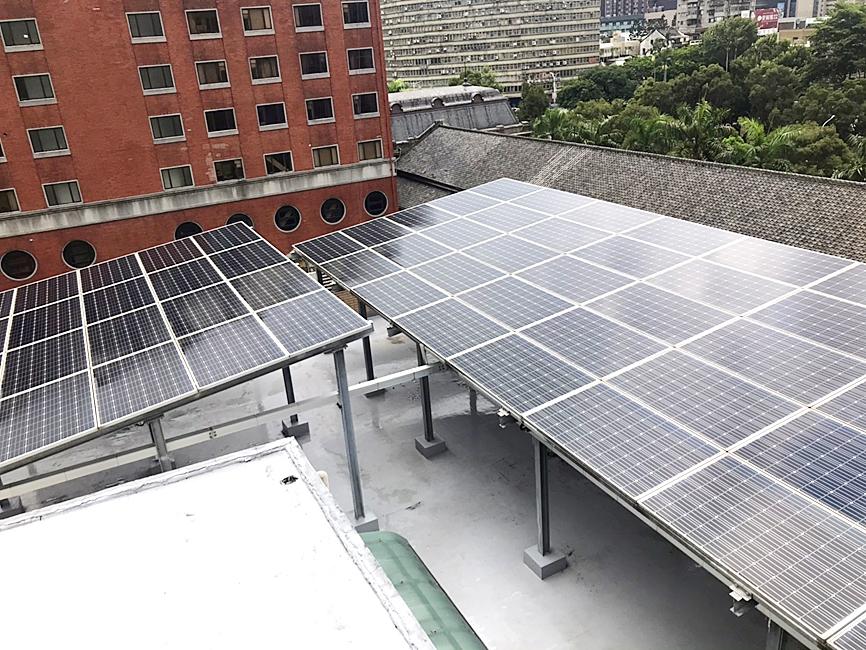A Republic of China (ROC) Military Academy project to install solar panels on its campus has reportedly been subcontracted to a company that is affiliated with China’s Huawei Technologies Co (華為), which was also found to have installed solar panels atop a building at the Legislative Yuan in Taipei, sparking concern over national security.
While the US and several European countries, as well as public agencies in Taiwan, have banned Huawei due to data security risks, the Chinese-language Apple Daily yesterday reported that it had received an anonymous tip that a construction project at the military academy in Kaohsiung has been subcontracted to New Green Power Co (永鑫能源), a distributor of power inverters manufactured by Huawei.
Although public bidding on the project in July last year was won by Cheng Yang Energy Co (承陽能源), it outsourced the project to New Green Power, sources said.

Photo: Peng Wan-hsin, Taipei Times
The report also said that arrays of solar panels on top of the Legislative Yuan’s Zhenjiang House (鎮江會館) on Zhenjiang Street are connected to an array of power inverters bearing “Green Power Co” and “Made in China” labels, as well as Huawei’s logo.
As power inverters have network functions, using Huawei’s inverters could allow Chinese hackers to interfere with Taiwan’s power supply, given that the rooftop solar panels would be connected to the grids owned by state-run Taiwan Power Co (Taipower, 台電), the nation’s sole electric utility, the sources said.
Changing the transmission frequency of the power inverters could disrupt the electricity grids, sending them into safety mode and triggering blackouts, they said.
Huawei devices might have backdoor software that transmits data — including on power generation and consumption — from power grids in Taiwan to China, lawmakers said.
Huawei is not just any Chinese company, but one with links to the Chinese People’s Liberation Army, so blocking the products is necessary against the backdrop of Chinese expansionism, not due to resentment against China, they said.
In response to lawmakers’ concerns, the Bureau of Energy and the Bureau of Standards, Metrology and Inspection agreed that Huawei products pose a data security risk, adding that the government would close any loopholes in regulations on the use of solar inverters at public facilities.
The Executive Yuan has demanded that all public entities comply with the Government Procurement Act (政府採購法), which states that products that could undermine national cybersecurity are banned, said a senior Cabinet official, who declined to be named.
No central government departments or agencies are using Huawei products, the source added.
The academy yesterday said that no contractors had come to the campus to carry out work, which is pending approval by the Kaohsiung City Government.
It would comply with the government’s information safety rules and not use Chinese products, it said.
Legislative Yuan Secretary-General Lin Chih-chia (林志嘉) yesterday said that he had ordered that the power inverters be promptly torn down, adding that Huawei products are strictly prohibited.
Additional reporting by CNA

A magnitude 5.6 earthquake struck off the coast of Yilan County at 12:37pm today, with clear shaking felt across much of northern Taiwan. There were no immediate reports of damage. The epicenter of the quake was 16.9km east-southeast of Yilan County Hall offshore at a depth of 66.8km, Central Weather Administration (CWA) data showed. The maximum intensity registered at a 4 in Yilan County’s Nanao Township (南澳) on Taiwan’s seven-tier scale. Other parts of Yilan, as well as certain areas of Hualien County, Taipei, New Taipei City, Taoyuan, Hsinchu County, Taichung and Miaoli County, recorded intensities of 3. Residents of Yilan County and Taipei received

Taiwan has secured another breakthrough in fruit exports, with jujubes, dragon fruit and lychees approved for shipment to the EU, the Ministry of Agriculture said yesterday. The Animal and Plant Health Inspection Agency on Thursday received formal notification of the approval from the EU, the ministry said, adding that the decision was expected to expand Taiwanese fruit producers’ access to high-end European markets. Taiwan exported 126 tonnes of lychees last year, valued at US$1.48 million, with Japan accounting for 102 tonnes. Other export destinations included New Zealand, Hong Kong, the US and Australia, ministry data showed. Jujube exports totaled 103 tonnes, valued at

BIG SPENDERS: Foreign investors bought the most Taiwan equities since 2005, signaling confidence that an AI boom would continue to benefit chipmakers Taiwan Semiconductor Manufacturing Co’s (TSMC, 台積電) market capitalization swelled to US$2 trillion for the first time following a 4.25 percent rally in its American depositary receipts (ADR) overnight, putting the world’s biggest contract chipmaker sixth on the list of the world’s biggest companies by market capitalization, just behind Amazon.com Inc. The site CompaniesMarketcap.com ranked TSMC ahead of Saudi Aramco and Meta Platforms Inc. The Taiwanese company’s ADRs on Tuesday surged to US$385.75 on the New York Stock Exchange, as strong demand for artificial intelligence (AI) applications led to chip supply constraints and boost revenue growth to record-breaking levels. Each TSMC ADR represents

TRUST: The KMT said it respected the US’ timing and considerations, and hoped it would continue to honor its commitments to helping Taiwan bolster its defenses and deterrence US President Donald Trump is delaying a multibillion-dollar arms sale to Taiwan to ensure his visit to Beijing is successful, a New York Times report said. The weapons sales package has stalled in the US Department of State, the report said, citing US officials it did not identify. The White House has told agencies not to push forward ahead of Trump’s meeting with Chinese President Xi Jinping (習近平), it said. The two last month held a phone call to discuss trade and geopolitical flashpoints ahead of the summit. Xi raised the Taiwan issue and urged the US to handle arms sales to